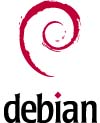Debian: Difference between revisions
imported>Subpagination Bot m (Add {{subpages}} and remove any categories (details)) |
imported>Scott Lewin m (Corrected stabe to stable) |
||
| Line 15: | Line 15: | ||
==Releases== | ==Releases== | ||
The Debian project does not have a regular release schedule, opting instead to release "when it's ready" (emphasizing quality instead of a strict deadline). | The Debian project does not have a regular release schedule, opting instead to release "when it's ready" (emphasizing quality instead of a strict deadline). Stable versions are released, on average, once every two years. | ||
The project maintains several inter-related distributions: '''stable''' is the current, official version, and receives security updates. When a new version is released, the old version becomes '''oldstable''' and continues to receive security updates for a set period of time (currently 18 months). Developers upload new packages into the '''unstable''' distribution which, therefore, contains the latest versions of packages. These are automatically moved to '''testing''' once they meet certain criteria. Periodically, it is frozen and becomes the next stable version. There is also an '''experimental''' distribution, for packages that are not meant to reach the next release. | The project maintains several inter-related distributions: '''stable''' is the current, official version, and receives security updates. When a new version is released, the old version becomes '''oldstable''' and continues to receive security updates for a set period of time (currently 18 months). Developers upload new packages into the '''unstable''' distribution which, therefore, contains the latest versions of packages. These are automatically moved to '''testing''' once they meet certain criteria. Periodically, it is frozen and becomes the next stable version. There is also an '''experimental''' distribution, for packages that are not meant to reach the next release. | ||
Revision as of 11:53, 29 October 2007
Debian is a free Linux distribution with thousands of contributors from all over the world. It serves as the basis for a number of other distributions, most notably Ubuntu and Knoppix. All of Debian is open source software, conforming to the Debian Free Software Guidelines. Many architectures are supported, including x86, AMD64, PowerPC, SPARC, ARM, etc. The latest version, code-named etch, was released on April 8, 2007.
History
Debian was created by Ian Murdock in 1993. The actual name of the project comes from the names of the creator of Debian, Ian Murdock, and his wife, Debra.[1]
The Debian Social Contract, a document describing the moral guidelines followed by the Debian project, was first published in July 1997.
Releases
The Debian project does not have a regular release schedule, opting instead to release "when it's ready" (emphasizing quality instead of a strict deadline). Stable versions are released, on average, once every two years.
The project maintains several inter-related distributions: stable is the current, official version, and receives security updates. When a new version is released, the old version becomes oldstable and continues to receive security updates for a set period of time (currently 18 months). Developers upload new packages into the unstable distribution which, therefore, contains the latest versions of packages. These are automatically moved to testing once they meet certain criteria. Periodically, it is frozen and becomes the next stable version. There is also an experimental distribution, for packages that are not meant to reach the next release.
Codenames for releases are inspired by the names of characters from the movie Toy Story. Previous stable releases have been named buzz (1.1), rex (1.2), bo (1.3), hamm (2.0), slink (2.1), potato (2.2), woody (3.0), sarge (3.1) and etch (4.0). The "unstable" version is known as "sid" - after the character that breaks toys for fun.
External Links
- www.debian.org - Debian project homepage
References
- ↑ About Debian: How'd it all get started?. Retrieved on 2007-08-01.
